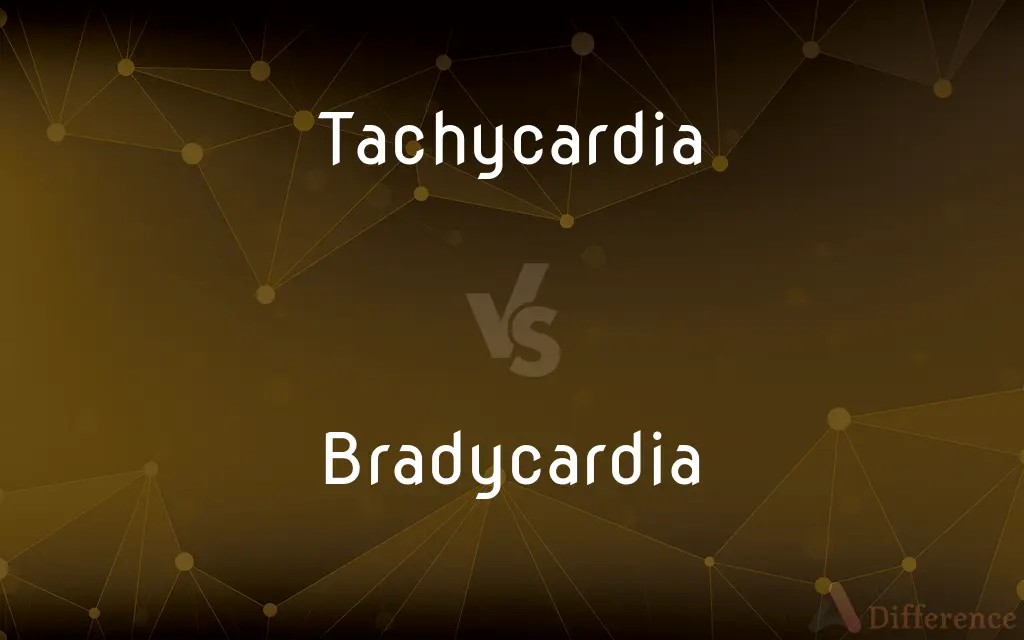Tachycardia vs. Bradycardia — What's the Difference?
By Tayyaba Rehman — Updated on October 21, 2023
Tachycardia is a condition where the heart beats faster than normal when at rest. Bradycardia is a condition where the heart beats slower than normal when at rest.

Difference Between Tachycardia and Bradycardia
Table of Contents
ADVERTISEMENT
Key Differences
Tachycardia refers to an abnormally rapid heartbeat, typically classified when an adult's resting heart rate is above 100 beats per minute. Bradycardia, in contrast, signifies an unusually slow heart rate, marked by fewer than 60 beats per minute in adults.
While Tachycardia might result from fever, anemia, electrolyte imbalances, or other medical conditions, it can also be a response to anxiety or stress. Bradycardia, on the other hand, might arise from aging, certain medications, or conditions that disrupt the electrical signals in the heart.
Both Tachycardia and Bradycardia can be asymptomatic or might manifest with symptoms. People with Tachycardia might experience dizziness, shortness of breath, or palpitations. Those with Bradycardia might feel fatigued, dizzy, or even faint.
It's crucial to pinpoint the cause of both Tachycardia and Bradycardia. While Tachycardia can be related to conditions like high BP or heart disease, Bradycardia can be linked to issues affecting the heart's electrical system. Treatment for each condition varies based on its underlying cause.
In some situations, both Tachycardia and Bradycardia might require medical intervention. Devices like pacemakers can be used to regulate heart rate for people with severe Bradycardia, while medications or other interventions might be required for those with Tachycardia.
ADVERTISEMENT
Comparison Chart
Definition
Rapid heartbeat (>100 bpm in adults).
Slow heartbeat (<60 bpm in adults).
Possible Causes
Stress, fever, medical conditions.
Aging, medications, heart signal disruptions.
Symptoms
Dizziness, palpitations, shortness of breath.
Fatigue, dizziness, fainting.
Relation to Heart Signals
Often related to rapid electrical signals.
Often due to disrupted electrical signals.
Treatment Devices
Sometimes medications or procedures.
Often pacemakers for severe cases.
Compare with Definitions
Tachycardia
Heart rate exceeding 100 bpm in adults when resting
His resting heart rate showed Tachycardia.
Bradycardia
An unusually slow heart rhythm
The elderly patient displayed Bradycardia.
Tachycardia
Can be caused by stress or anxiety
She experienced Tachycardia during the intense meeting.
Bradycardia
Heart rate below 60 bpm in adults when at rest
The athlete's training resulted in a resting Bradycardia.
Tachycardia
Rapid firing of the heart's electrical signals
The Tachycardia was traced to erratic electrical impulses.
Bradycardia
May require a pacemaker if severe
To treat her Bradycardia, doctors recommended a pacemaker.
Tachycardia
An abnormally fast heart rhythm
The patient was diagnosed with Tachycardia after the EKG.
Bradycardia
Often seen in well-trained athletes
The marathon runner's heart rate showed Bradycardia.
Tachycardia
A symptom of potential underlying conditions
The Tachycardia might be due to her anemia.
Bradycardia
Can be a sign of disruptions in heart's electrical system
His Bradycardia was due to a block in heart signals.
Tachycardia
Tachycardia, also called tachyarrhythmia, is a heart rate that exceeds the normal resting rate. In general, a resting heart rate over 100 beats per minute is accepted as tachycardia in adults.
Bradycardia
Bradycardia is a condition typically defined wherein an individual has a resting heart rate of under 60 beats per minute (BPM) in adults, although some studies use a heart rate of less than 50 BPM. Bradycardia typically does not cause symptoms until the rate drops below 50 BPM. When symptomatic, it may cause fatigue, weakness, dizziness, sweating, and at very low rates, fainting.During sleep, a slow heartbeat with rates around 40–50 BPM is common, and is considered normal. Highly trained athletes may also have athletic heart syndrome, a very slow resting heart rate that occurs as a sport adaptation and helps prevent tachycardia during training.The term "relative bradycardia" is used to refer to a heart rate that, although not actually below 60 BPM, is still considered too slow for the individual's current medical condition.
Tachycardia
A rapid heart rate, especially one above 100 beats per minute in an adult.
Bradycardia
Abnormally slow heart action.
Tachycardia
A rapid resting heart rate, especially one above 100 beats per minute.
Bradycardia
Slowness of the heart rate, usually fewer than 60 beats per minute in an adult human.
Tachycardia
Abnormally rapid heartbeat (over 100 beats per minute)
Bradycardia
(medicine) The condition of having a slow heartbeat, defined as under 60 beats per minute for an adult.
Bradycardia
Abnormally slow heartbeat
Common Curiosities
Can Tachycardia be dangerous?
Yes, if left untreated or if it's severe, Tachycardia can lead to complications, while Bradycardia can also be problematic in some situations.
Can stress cause Tachycardia?
Yes, stress and anxiety can lead to Tachycardia, while Bradycardia typically isn't related to stress.
Is Bradycardia common in athletes?
Yes, well-trained athletes often have a lower resting heart rate, resulting in Bradycardia.
Is Bradycardia always a sign of a problem?
Not always. It can be normal in some people, especially athletes, but it can be problematic if due to a heart condition.
Are there different types of Tachycardia?
Yes, there are various types like atrial fibrillation or ventricular Tachycardia, while Bradycardia is generally categorized by its cause.
Can medications cause Bradycardia?
Yes, certain medications can result in Bradycardia, whereas some drugs might cause Tachycardia.
Can both conditions be treated?
Yes, treatment varies based on the cause but can include medications, lifestyle changes, or devices like pacemakers for Bradycardia.
How is Tachycardia diagnosed?
Through tests like EKGs, while Bradycardia is also diagnosed similarly.
Share Your Discovery

Previous Comparison
Go vs. Ruby
Next Comparison
Thigmotropism vs. ThigmonastyAuthor Spotlight
Written by
Tayyaba RehmanTayyaba Rehman is a distinguished writer, currently serving as a primary contributor to askdifference.com. As a researcher in semantics and etymology, Tayyaba's passion for the complexity of languages and their distinctions has found a perfect home on the platform. Tayyaba delves into the intricacies of language, distinguishing between commonly confused words and phrases, thereby providing clarity for readers worldwide.
















































